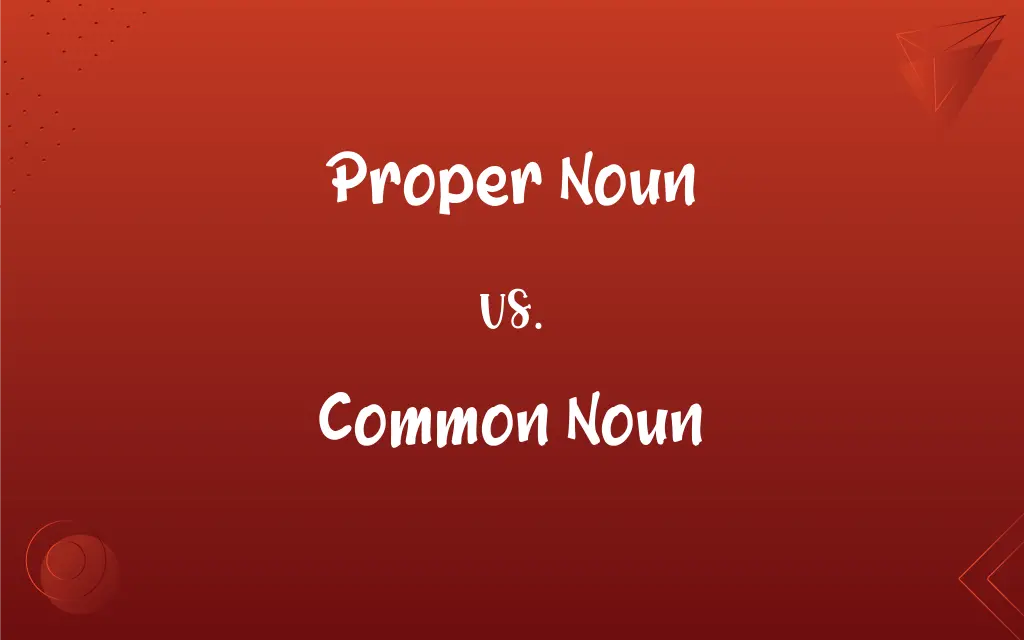Proper Noun vs. Common Noun: What's the Difference?
Edited by Aimie Carlson || By Janet White || Published on December 2, 2023
A proper noun is a specific name of a person, place, or thing (always capitalized), while a common noun is a general name for a person, place, or thing.

Key Differences
Proper nouns are used to name specific entities, uniquely identifying them. While, common nouns refer to general items, without specifying unique entities.
Proper nouns are always capitalized as they denote specific names like 'London' or 'Elizabeth'. Whereas, common nouns are not capitalized unless they start a sentence, e.g., 'city', 'woman'.
Proper nouns represent individual names, titles, or places, such as 'Amazon River' or 'The Beatles'. However, common nouns encompass a broad category of items, like 'river', 'band'.
In sentences, proper nouns provide exact references, making it clear what is being discussed. Common nouns are used in a more general sense, providing a broad categorization.
Comparison Chart
Specificity
Names specific entities
Refers to general categories
ADVERTISEMENT
Capitalization
Always capitalized
Not capitalized unless starting a sentence
Examples
'New York', 'Shakespeare'
'city', 'writer'
Usage in Sentences
Identifies particular individuals/places
Used to denote a general class or type
Variation
Unique to the entity named
General and can be used widely
Proper Noun and Common Noun Definitions
Proper Noun
A proper noun is the specific name of a person, place, or thing.
Alice visited Paris last summer.
ADVERTISEMENT
Common Noun
Represents broad categories or classes.
He drives a truck for a living.
Proper Noun
It also names specific events and dates.
Thanksgiving is celebrated in November in the United States.
Common Noun
It refers to non-specific entities.
She loves reading books.
Proper Noun
It uniquely identifies a particular entity.
Mount Everest is the highest mountain in the world.
Common Noun
A common noun is a general term for people, places, or things.
The park was full of trees and flowers.
Proper Noun
It includes titles of works and names of organizations.
She reads the 'New York Times' every morning.
Common Noun
It can represent general concepts or ideas.
Happiness is important in life.
Proper Noun
Proper nouns are always capitalized.
The novel was written by George Orwell.
Common Noun
Common nouns are not capitalized unless at the start of a sentence.
Birds migrate south in the winter.
FAQs
Can a common noun become a proper noun?
A common noun can become a proper noun if it's part of a specific name, like 'River' in 'Mississippi River'.
What is a proper noun?
A proper noun is a specific name for a person, place, or thing, always capitalized.
Can the same word be both a proper and a common noun?
Yes, depending on usage, like 'Apple' the company (proper noun) and 'apple' the fruit (common noun).
How can I identify a common noun in a sentence?
Common nouns are general names and are not capitalized unless they start a sentence.
What is a common noun?
A common noun is a general name for any person, place, or thing, not usually capitalized.
Are all nouns either proper or common?
Yes, all nouns are categorized as either proper or common.
Do proper nouns always refer to one-of-a-kind items?
Proper nouns refer to specific, unique entities, but there can be multiple entities with the same name.
Are brand names considered proper nouns?
Yes, brand names are proper nouns as they are specific names.
Do proper nouns have plural forms?
Proper nouns can have plural forms if they refer to multiple entities, like 'The Smiths'.
Why are proper nouns capitalized?
Proper nouns are capitalized to signify that they are specific, unique names.
Are all places' names proper nouns?
Yes, names of specific places are proper nouns.
Are job titles proper nouns?
Job titles are common nouns unless part of a specific name, like 'President Biden'.
Are all capitalized words proper nouns?
Not always, as words can be capitalized for reasons other than being a proper noun, like at the beginning of sentences.
Are days of the week and months proper nouns?
Yes, days of the week and months are considered proper nouns.
Can a proper noun be used generically?
Sometimes, like 'Kleenex' for tissues, but it's still a proper noun.
Do proper nouns change in different languages?
Proper nouns usually remain the same across languages but can have different pronunciations.
Can a common noun be specific?
While it can refer to specific things, it remains general in nature and is not a unique identifier.
Is 'earth' a proper or a common noun?
It's a common noun when referring to soil or ground, and a proper noun when referring to the planet Earth.
How do proper nouns differ in different cultures?
Proper nouns can vary culturally, especially in terms of names of people and places.
Can a proper noun be abstract?
Yes, if it's the specific name of an abstract concept, like a book title.
About Author
Written by
Janet WhiteJanet White has been an esteemed writer and blogger for Difference Wiki. Holding a Master's degree in Science and Medical Journalism from the prestigious Boston University, she has consistently demonstrated her expertise and passion for her field. When she's not immersed in her work, Janet relishes her time exercising, delving into a good book, and cherishing moments with friends and family.
Edited by
Aimie CarlsonAimie Carlson, holding a master's degree in English literature, is a fervent English language enthusiast. She lends her writing talents to Difference Wiki, a prominent website that specializes in comparisons, offering readers insightful analyses that both captivate and inform.

































































